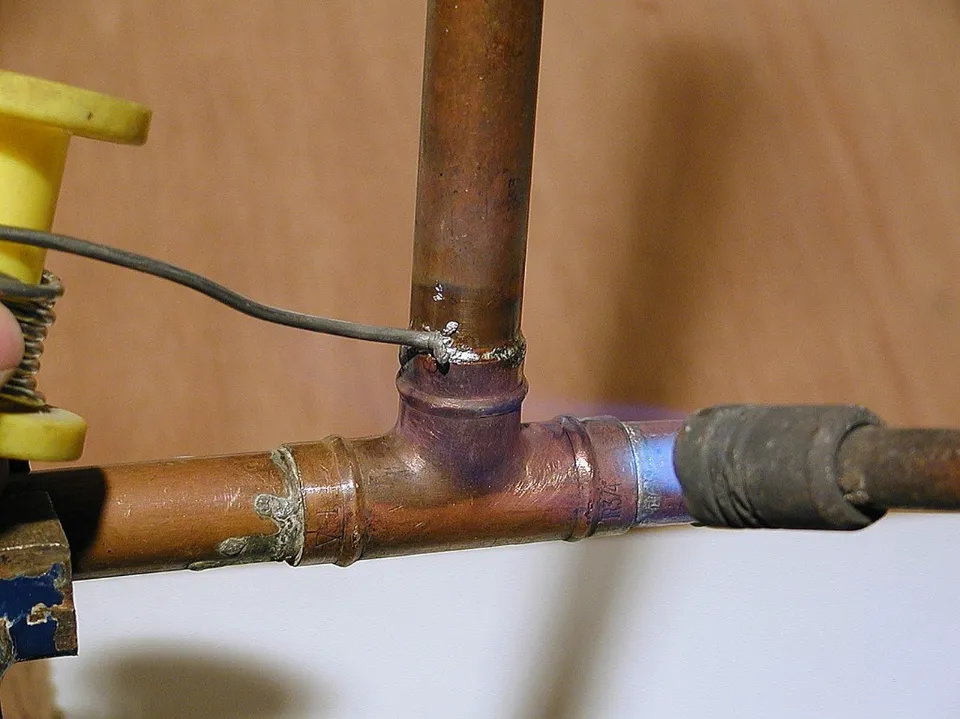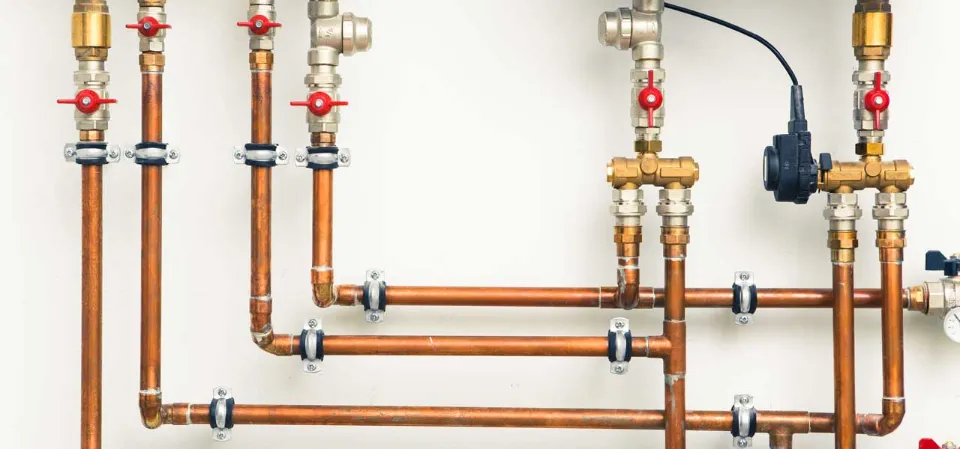This blog explains how long copper pipes can last depending on different types and tells you how to extend the lifespan of your copper pipes.
Despite the long lifespans of copper pipes, all materials eventually deteriorate. Knowing the lifespan of your pipes will help you plan for timely replacements whether you have copper pipes that are already in place or a brand-new system.
On average, copper pipes last around 50 years before they need to be replaced, but certain factors like the type of piping and accumulated wear-and-tear damage can shorten or extend that lifespan.
The different kinds of copper pipes that are sold today and the warning signs that your copper piping may need to be inspected are both covered in this article.
How Long Do Copper Pipes Last? Different Types
The lifespan of copper pipes is said to be between 50 and 70 years. The mid-range pipes are the only ones for which that is true. The actual lifespan of each type of pipe is shown below.
M-Type
The smallest copper pipe suitable for residential plumbing is Type M. While some people argue these pipes should last 50 years, in practice, they may not last more than 20. The thin walls of the M-type pipe don’t provide much protection against this wear and tear. Copper pipes will corrode if exposed to water with high acid levels.
Some people attribute the early failure of copper pipes to the presence of acidic water, but choosing the M-type pipe, which is thinner, has a significant impact on how quickly these pipes fail. After all, the acidity of your water when it is brought in from the city is not always in your control.
Additionally, well water might not have a pH balance and can wear down pipes much more quickly than you might anticipate.

L-Type
L-type piping lasts at least 50 years, on average, but may last more than 100. The majority of plumbers advise using L-type piping because of its durability and thickness, which gives homeowners peace of mind. Even with acidic water, high-quality copper piping can withstand many decades of use.
K-Type
K-type piping lasts for at least 100 years. For water mains in cities and other non-residential plumbing applications, it is the thickest copper piping available. Although this pipe can withstand even greater pressure than L-type, it is not necessary for your home’s plumbing to be this durable. In addition, the majority of homeowners cannot afford these pipes.
Further Reading: The Advantages And Disadvantages Of Clay Sewer Pipe Repair
When Do You Need a Check-Up for Your Home’s Copper Piping?
Pipe maintenance is a bothersome task that both home and business owners like to put off as long as they can. Needless to say, that is a bad idea, and if you want to keep problems at bay, regular routine pipe inspections must be performed occasionally.
Even if there are no obvious piping issues in your home, you should ideally perform this once every two years. However, even if you really don’t want to bother or if it’s only been a few months, there are some signs you should never ignore:
Water Discoloration
Water discoloration, typically moving toward brown or even black water, will soon follow the metallic aftertaste if the insides of your copper pipes have begun to experience some corrosion.
Low Water Pressure

Numerous issues, including blocked faucets and others, can lead to low water pressure. However, another plausible explanation is pipe leaks or pinholes, which call for pipe maintenance.
Physical Issues on Exposed Pipes
At least a few exposed pipes are present in the majority of piping installations, whether in a residential or industrial setting, and they are typically found in the bathroom or basement.
It’s a good idea to keep an eye on the condition of those pipes because they can let you know when it’s time to call a specialist for a routine inspection. There are telltale signs that something is wrong with those pipes, including bumps, flaking, or dimpling.
The Causes of Copper Pipe Corrosion
Although copper pipes are made to resist corrosion, this is not a guarantee. Similar to other pipe materials, they may eventually begin to degrade. Your pipes may dissolve even more quickly than expected if certain issues, such as high-acid water, are present.
Acidic Water and Copper Pipes
The ideal pH of the drinking water entering your home is 7, but occasionally the pH is between 0 and 6.5, which is considered to be acidic. The pH of drinking water is unregulated by the EPA. The goal should be to keep it as neutral as possible, though.
Your pipes may deteriorate if the water you drink at home is acidic. Copper ends up in your water as a result. Your water may taste metallic and develop blue-green stains on your faucets as a result of the copper’s deterioration.
Leaks in your pipes can also be caused by the copper’s gradual deterioration. Most of which will be small and difficult to locate right away. A larger problem, such as the growth of mold, could result from this slow water leak.
Copper Contaminated Water

Your drinking water may begin to be affected if the copper pipes are corroded by age or acidic water. Copper overdose is known to result in health problems like nausea, vomiting, and diarrhea.
Fortunately, these problems are not common. According to the CDC, older homes that require new pipes are the only ones where these problems typically arise. According to the CDC, if your water is contaminated by copper pipes you can try the following treatments:
- Reverse Osmosis
- Ultra-filtration
- Distillation
- Ion exchange
Alternatively, you might try flushing your faucet. Before using a sink or shower that has been idle for longer than six hours, run the water for 15 seconds.
How Can You Prolong the Life of Copper Pipes?
Given that you went to the trouble of purchasing copper pipes, it would be in your best interest to keep them in working order for as long as you can.
Your plumbing system’s new pipes will be better protected now that you are aware of the primary causes of copper corrosion.
Regular copper pipe cleaning is also a good idea. To keep the copper pipes clear of debris, you can use household items or commercial cleaners. You might want to let the experts handle them if it’s been a while since you gave them a thorough cleaning.
Copper pipe defense is another area where phosphate feeders excel. Since you cannot directly clean those, they are especially effective at keeping the copper pipes’ interior walls safe.
Conclusion: How Long Do Copper Pipes Last?
High-quality copper pipes have an average expected lifespan of 70 to 80 years, though most pessimistic estimates place that number closer to 50.
There are various types of copper piping used in residential and commercial plumbing, and each has a different average lifespan to take into account. None of these types of copper piping are created equally. The different piping thicknesses that are available are largely to blame for this. Generally speaking, your pipes will last longer if they are thicker.
FAQs
Do Copper Pipes Ever Go Bad?
While copper pipes have a life expectancy of anywhere between 5-50 years, many factors affect their realistic lifetime. You can make the most of your home’s copper pipes by maintaining a favorable environment, such as regulating the water pressure and performing routine maintenance.
Why Do Plumbers Still Use Copper Pipes?
In the developed world, copper is the plumbing tube material that is most dependable and frequently used. Copper is beneficial in underground applications because it is highly corrosion-resistant in most underground environments. It can withstand stresses without failing thanks to its superior strength.
Do Copper Pipes Burst Easily?
Copper pipes can easily burst in a freeze. Heat is quickly lost through copper plumbing pipes. When water freezes, the material doesn’t expand; instead, the pipes crack or split open.





